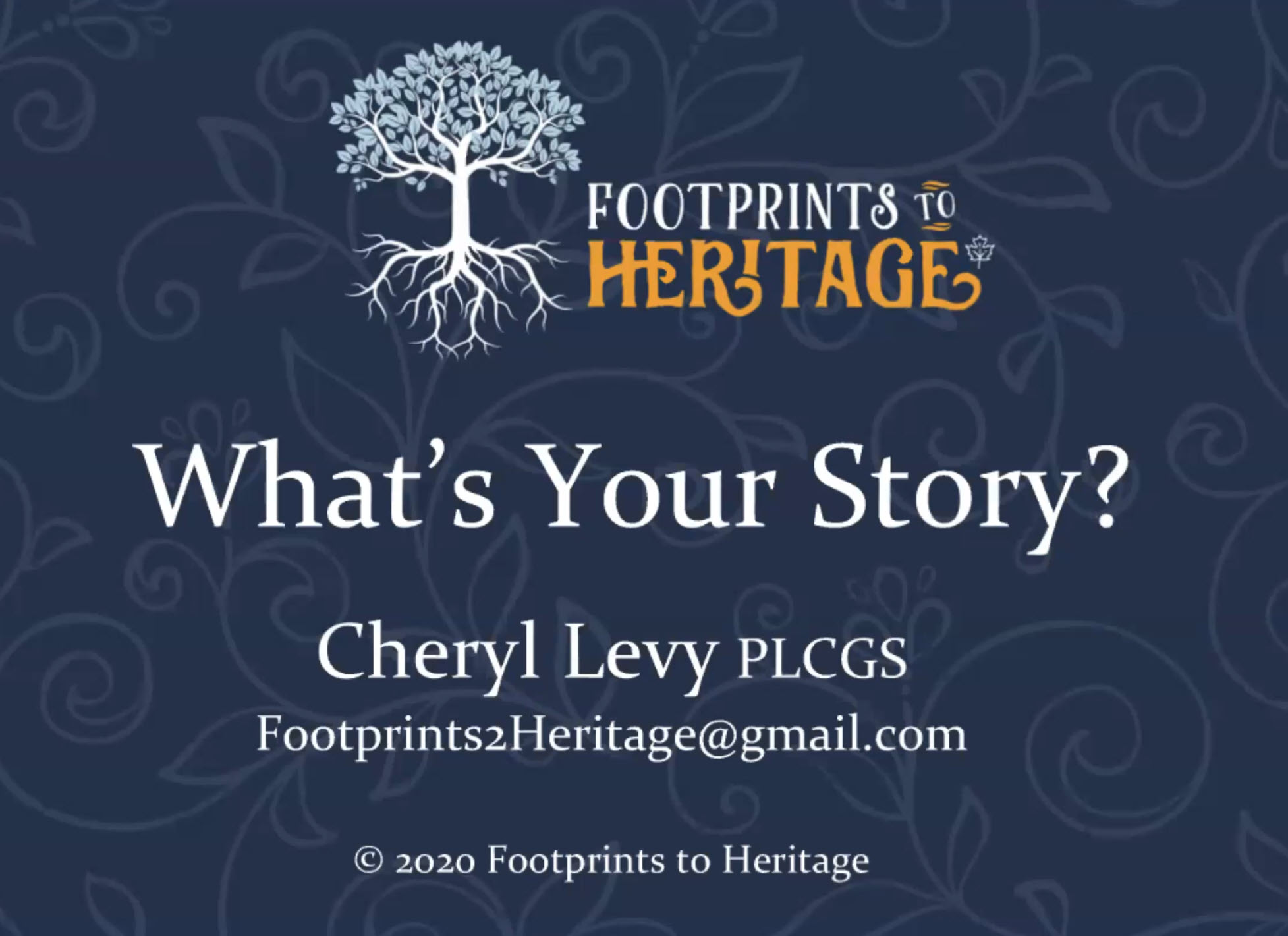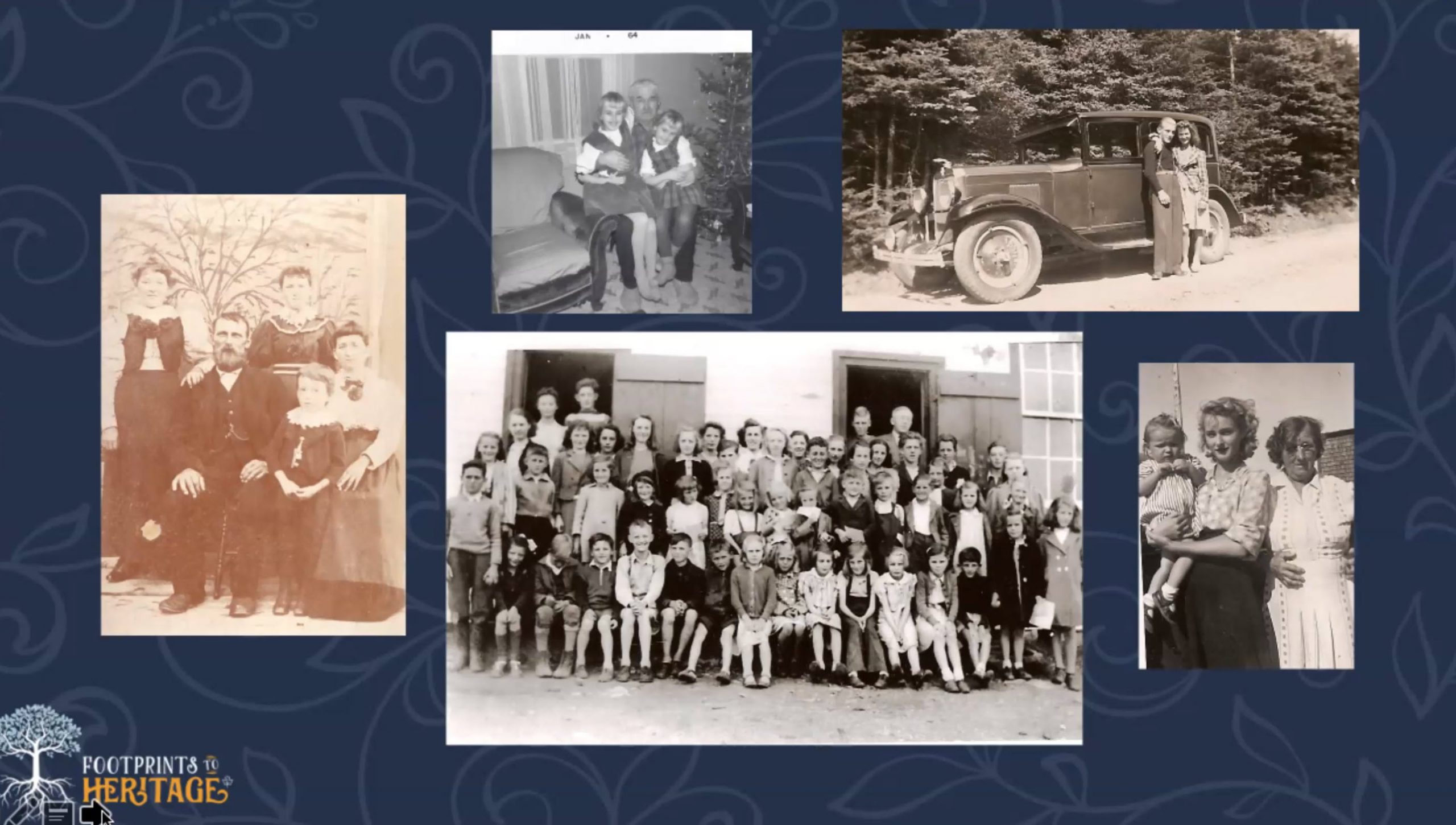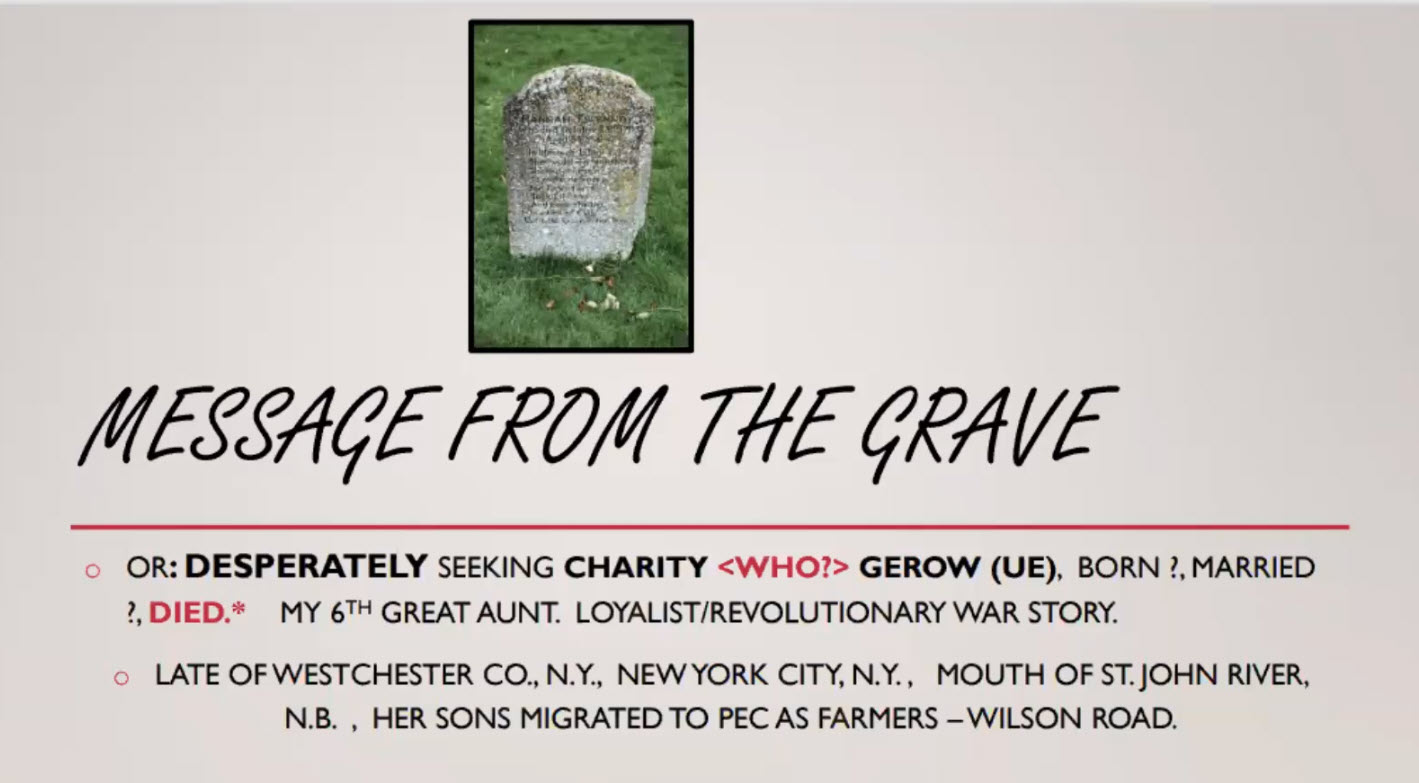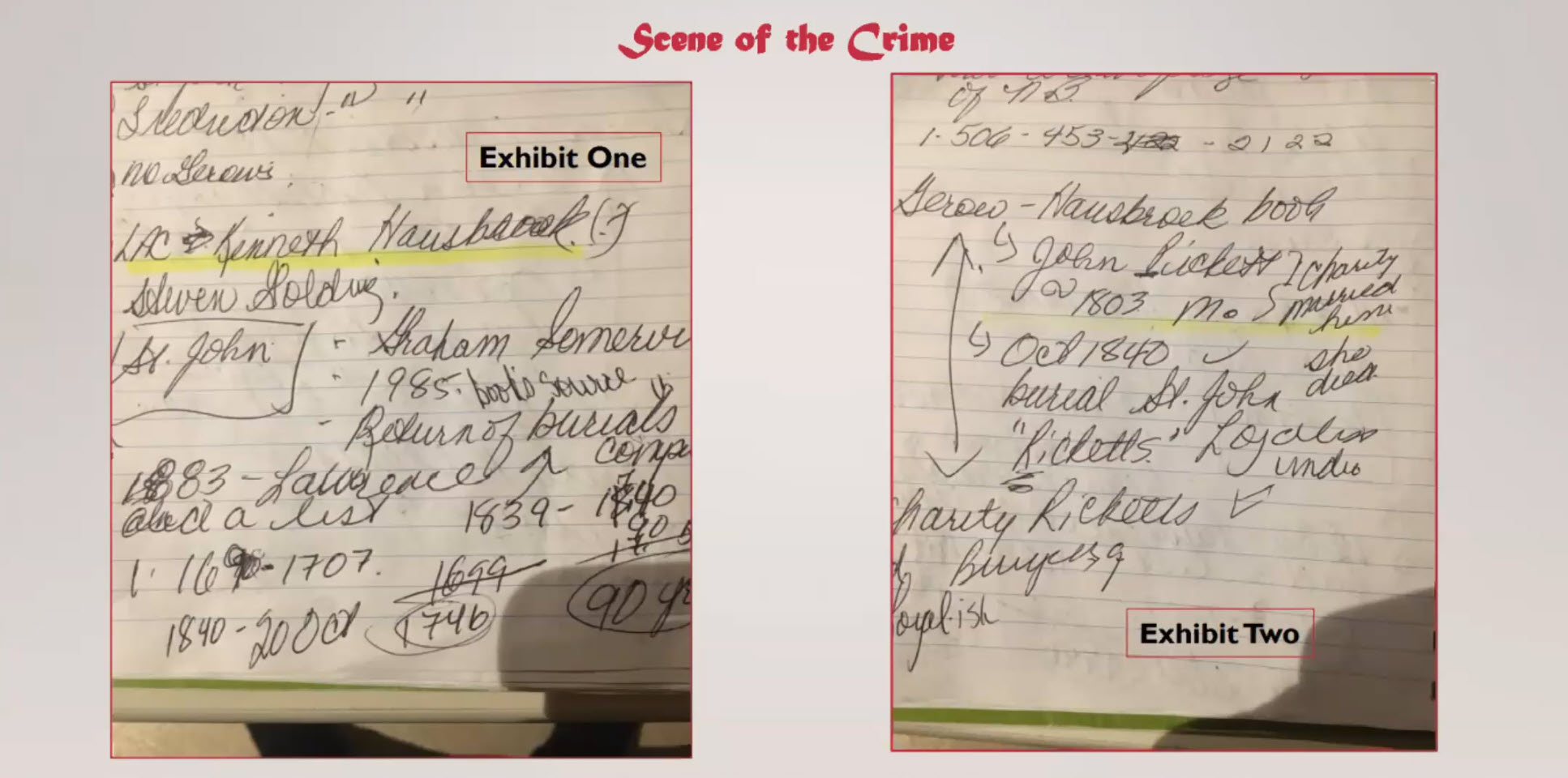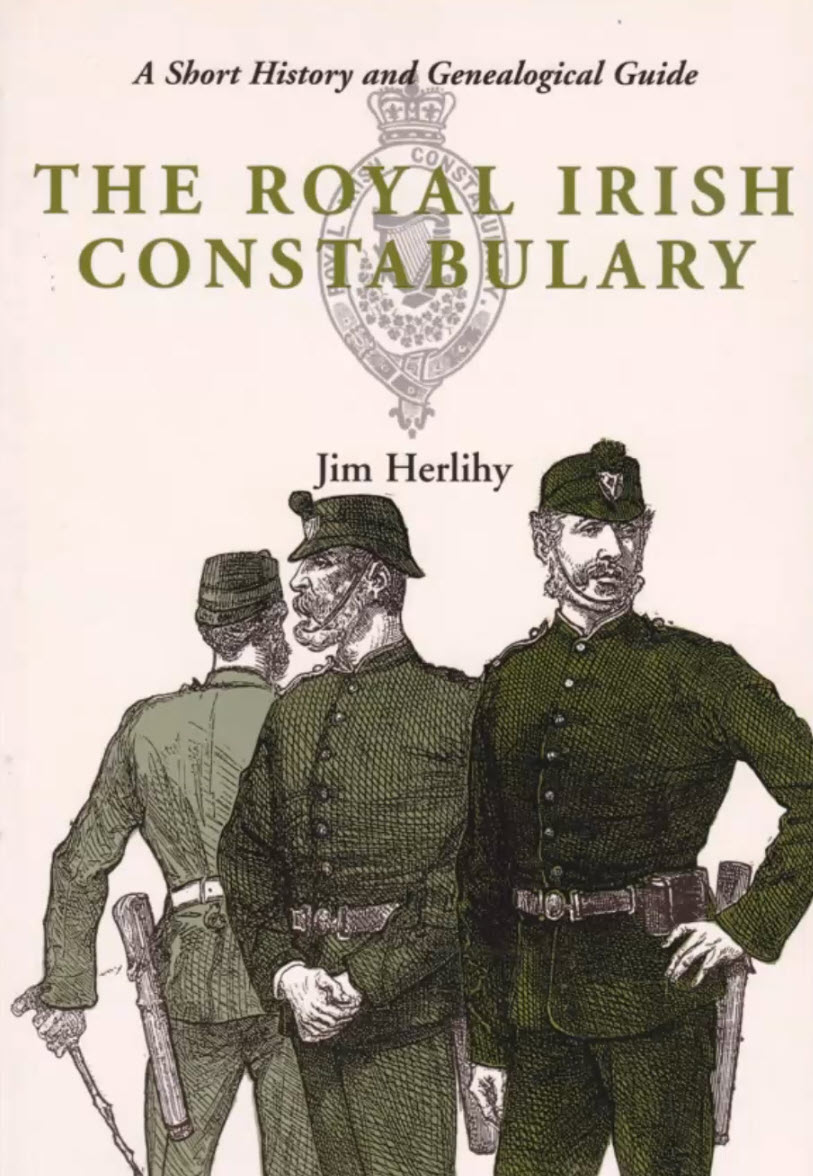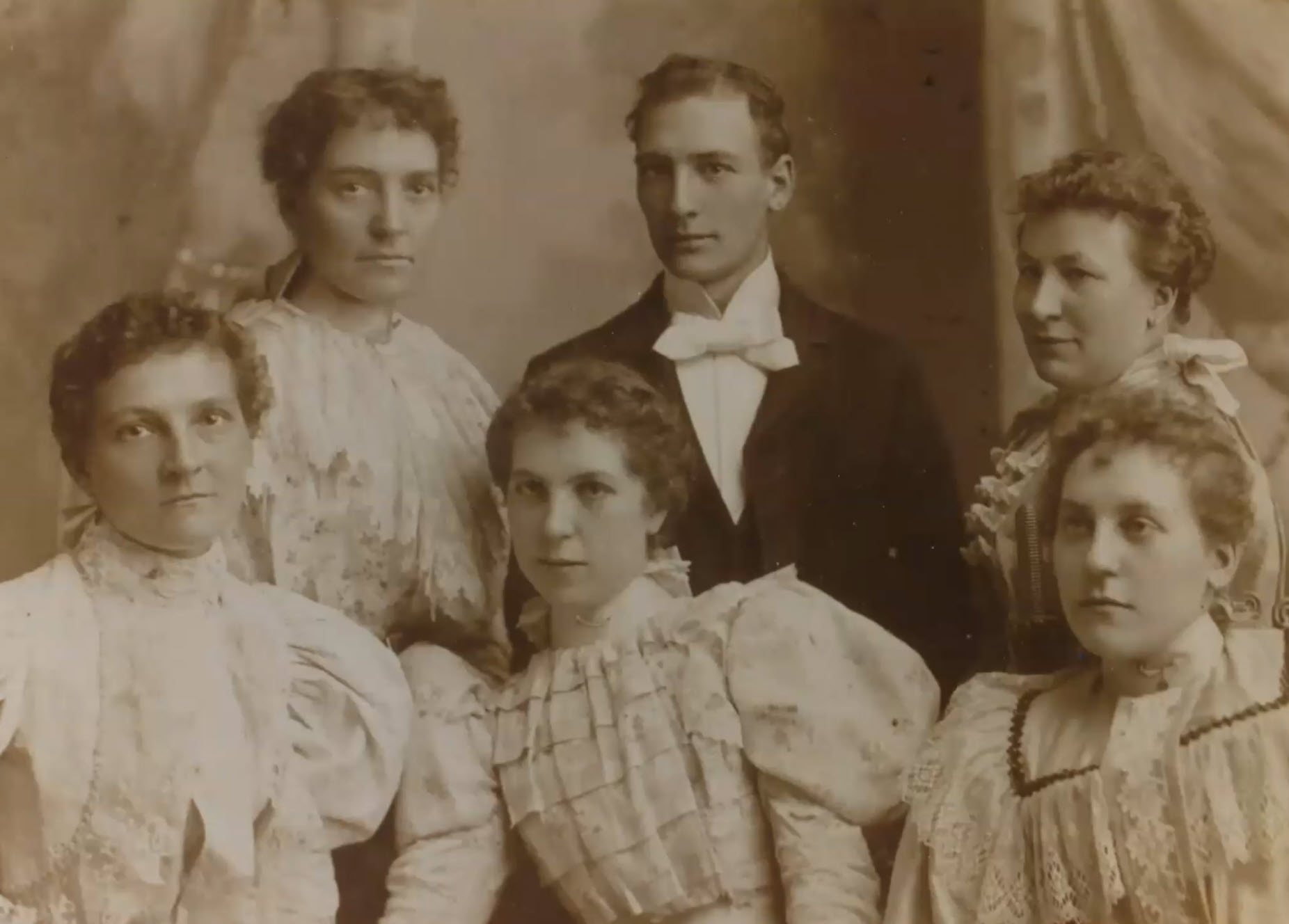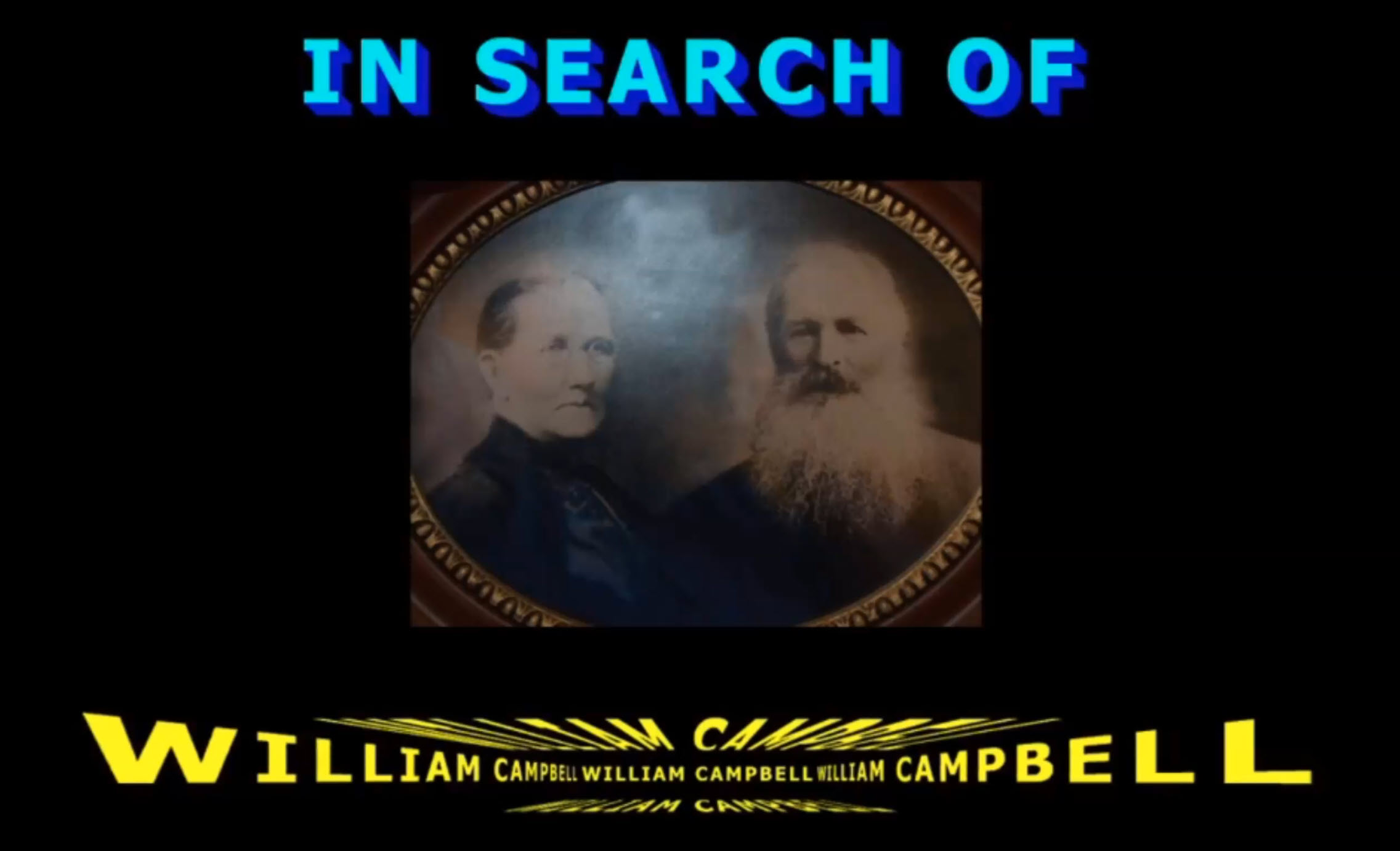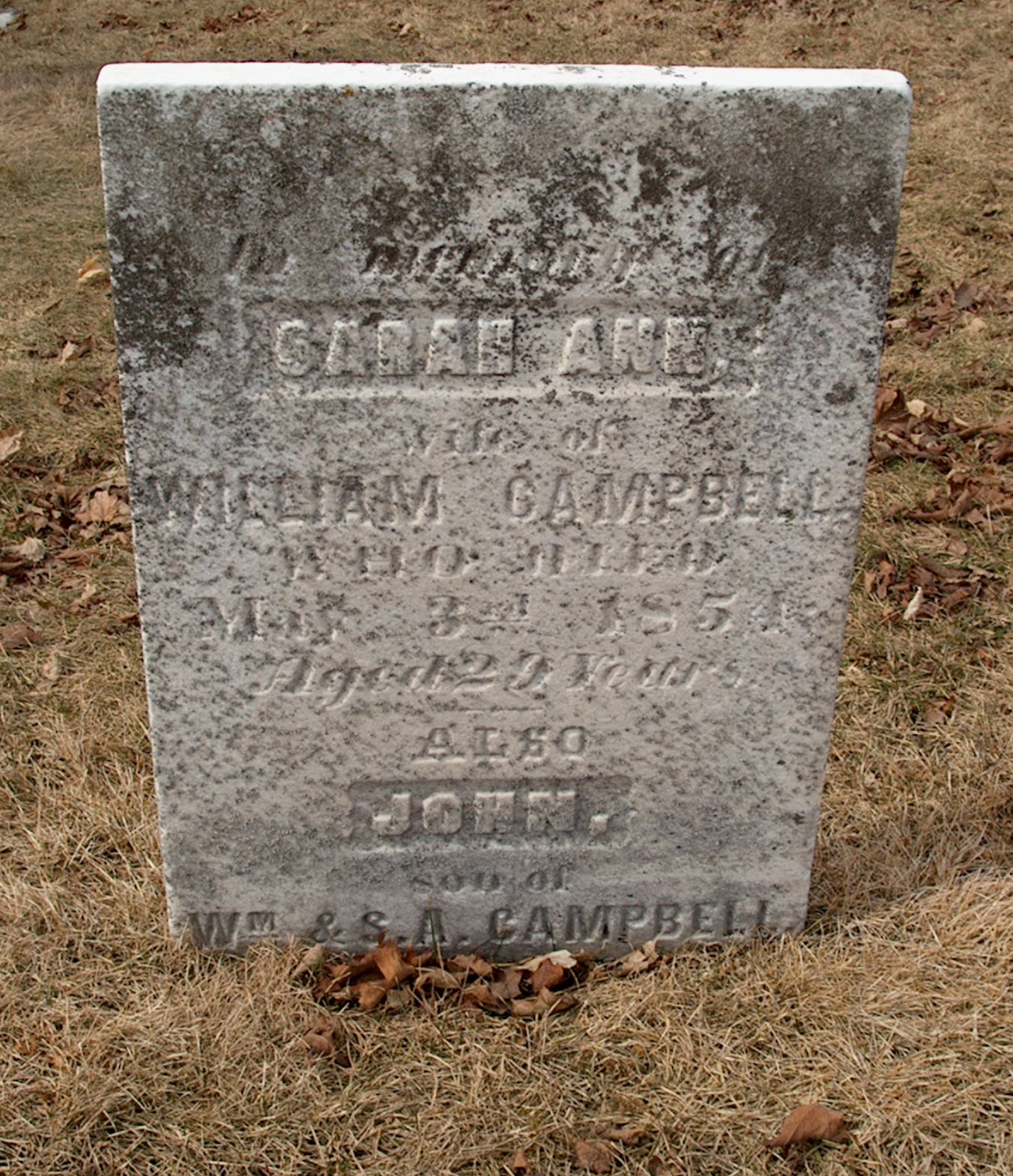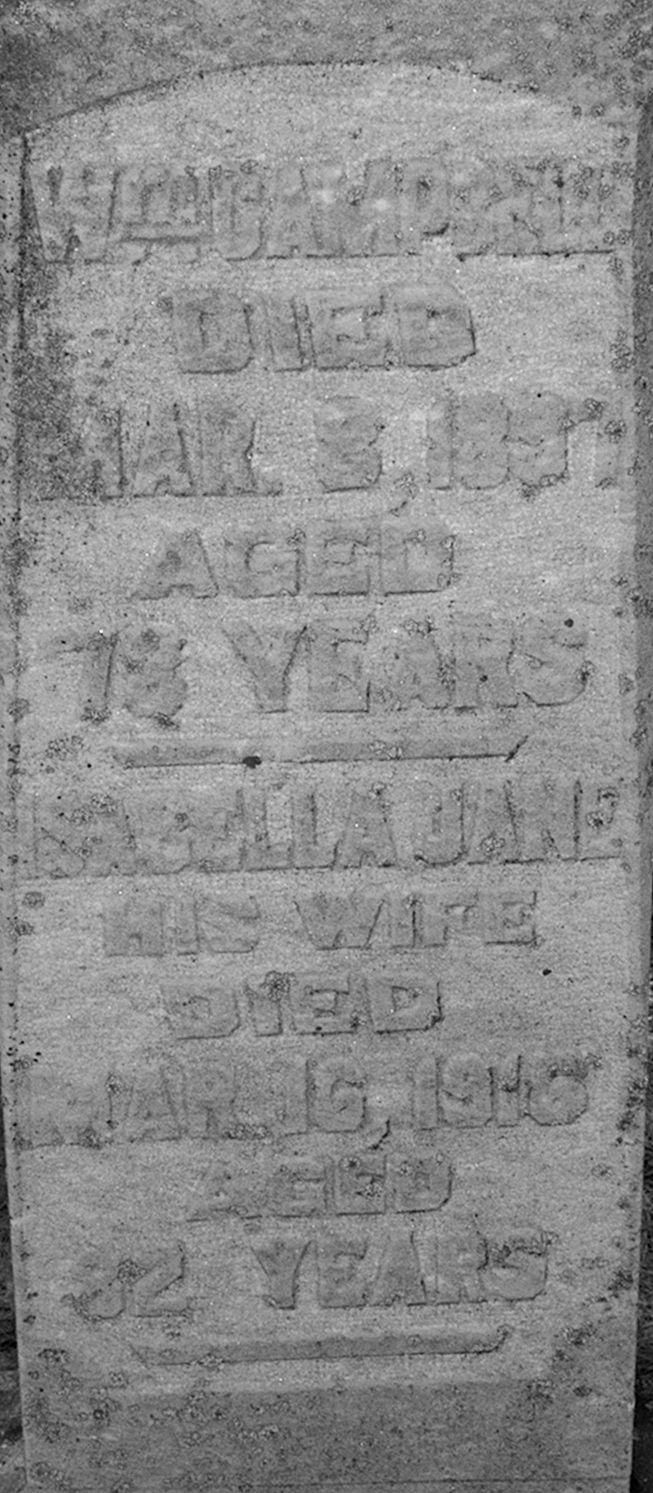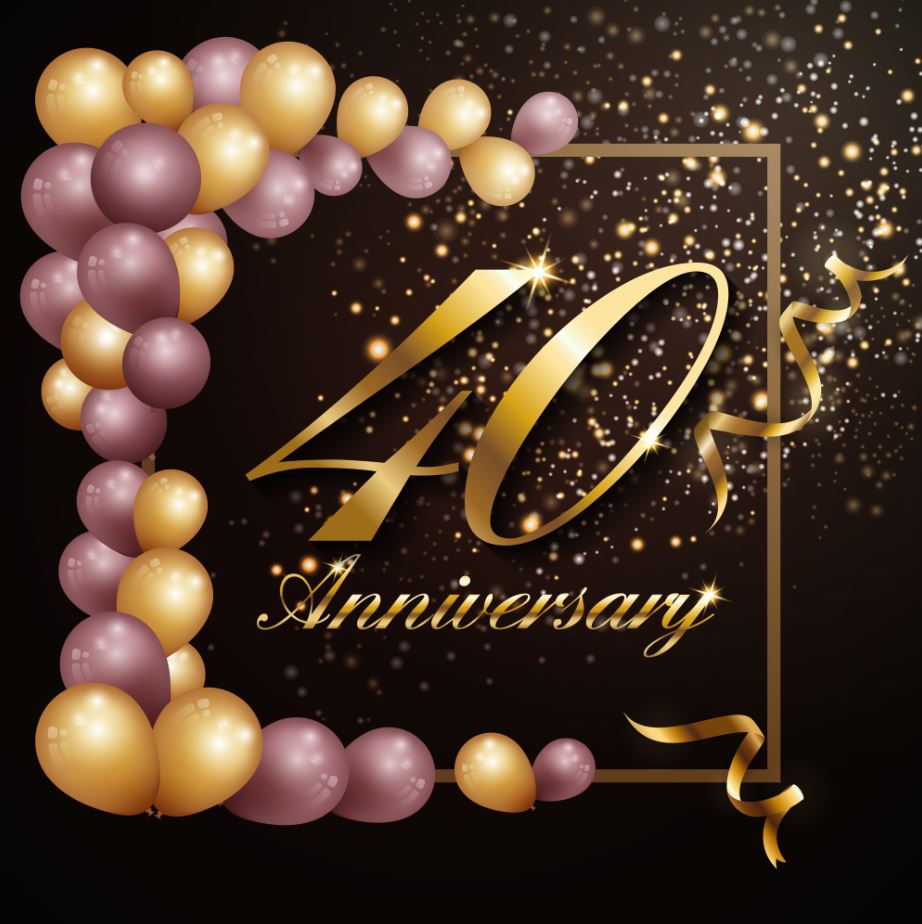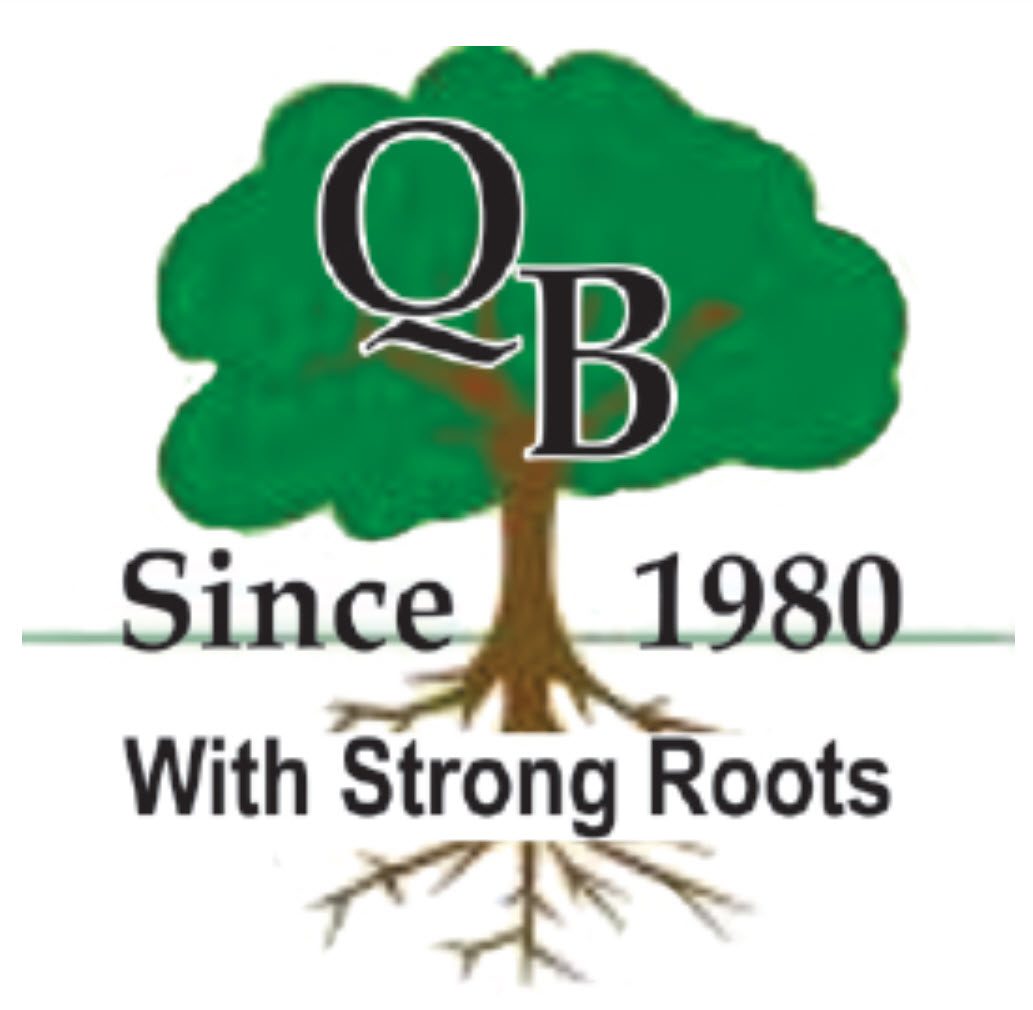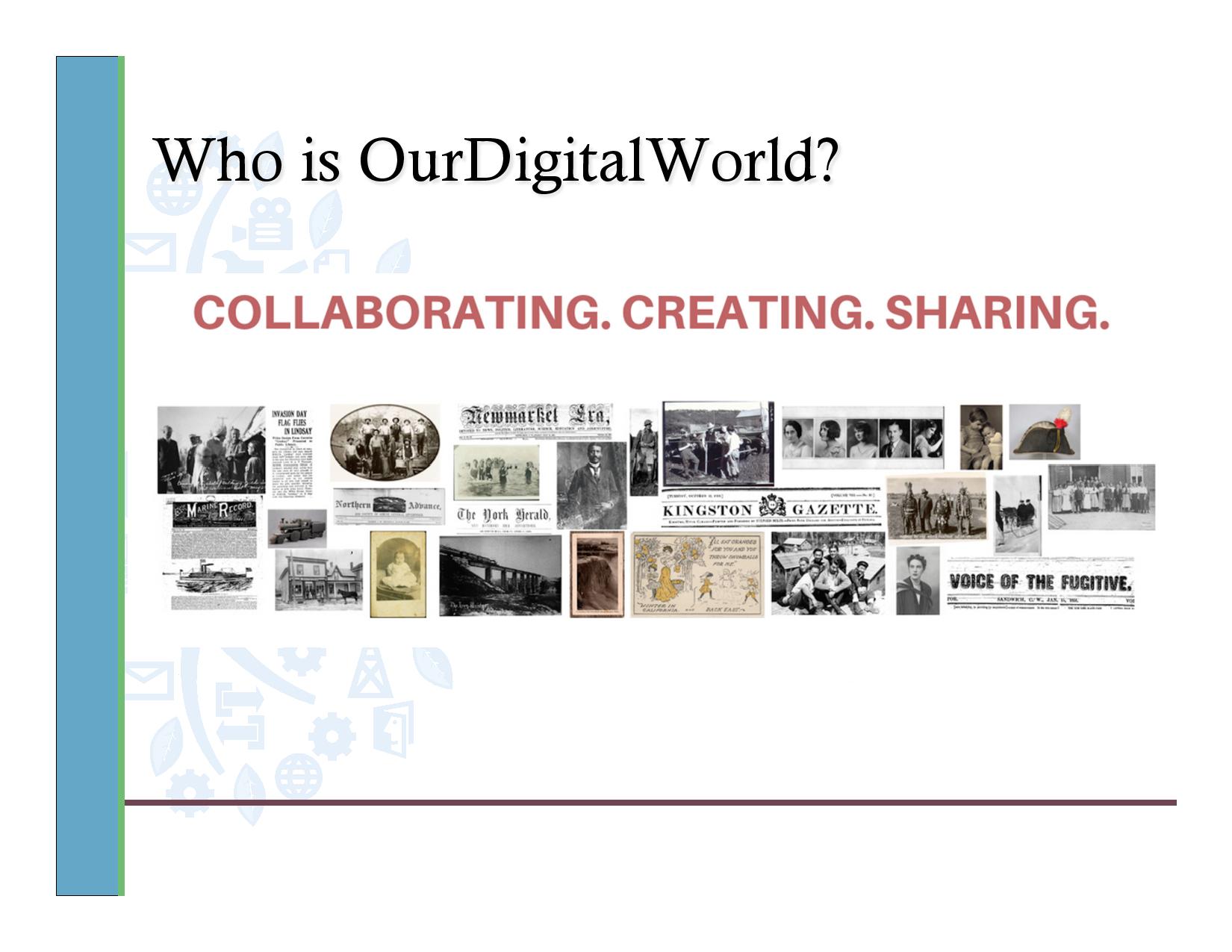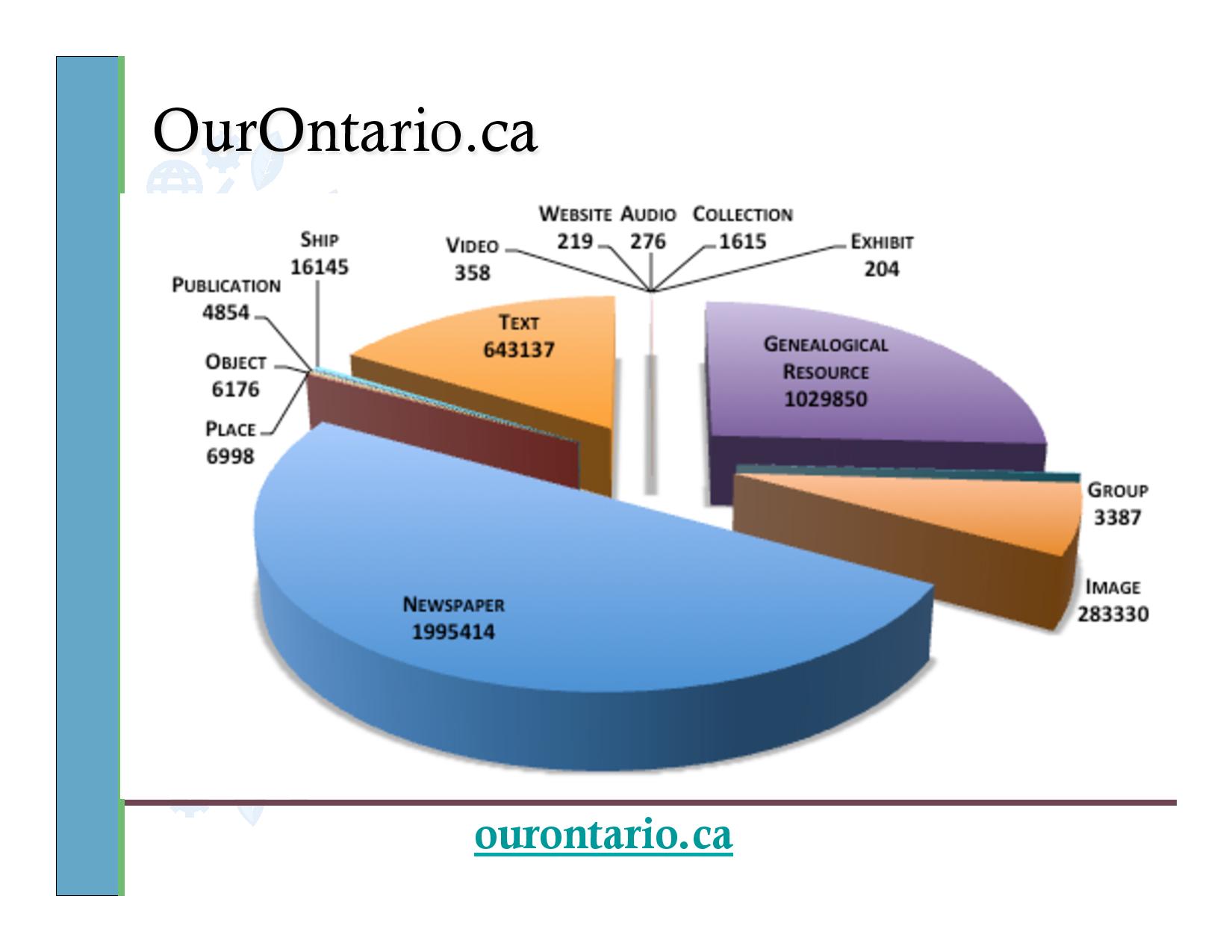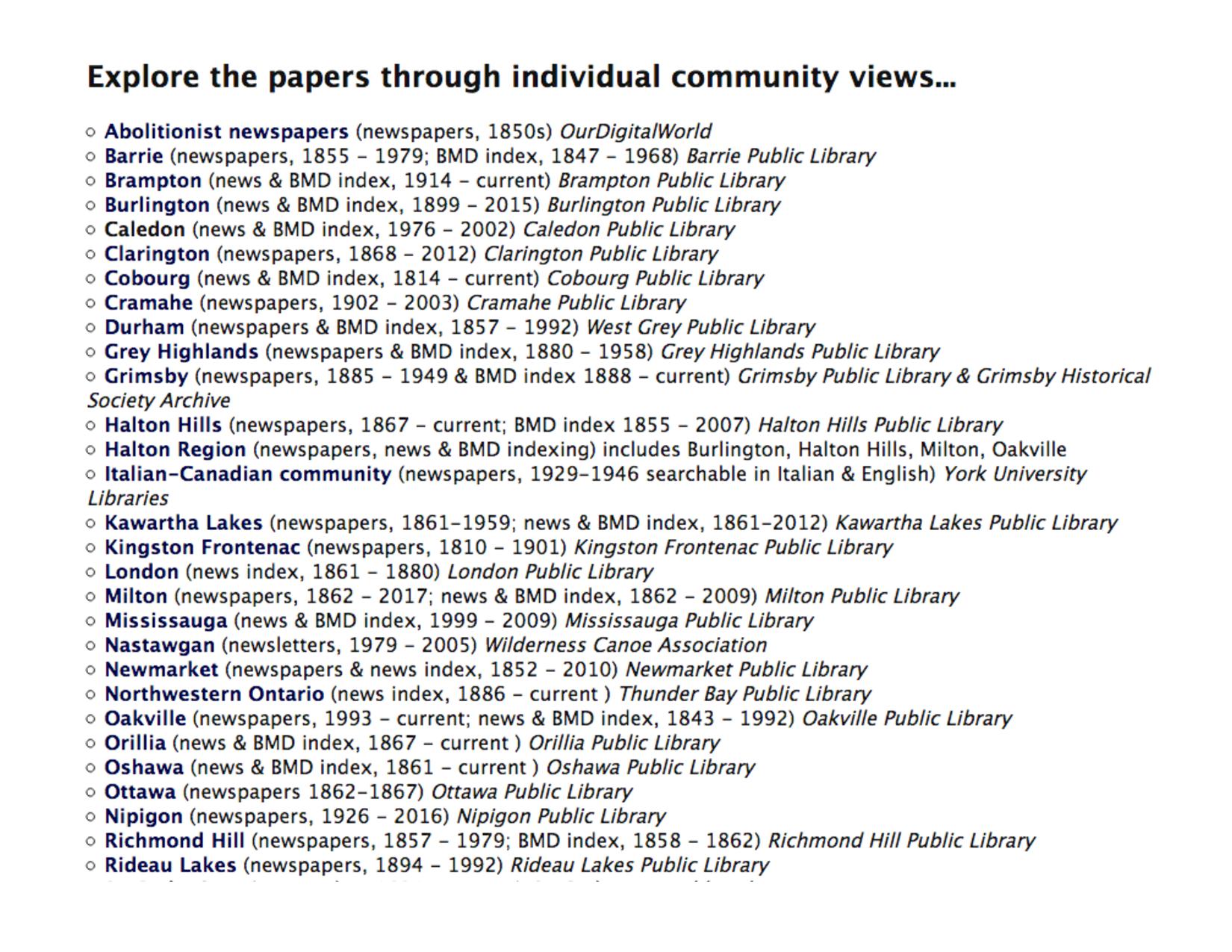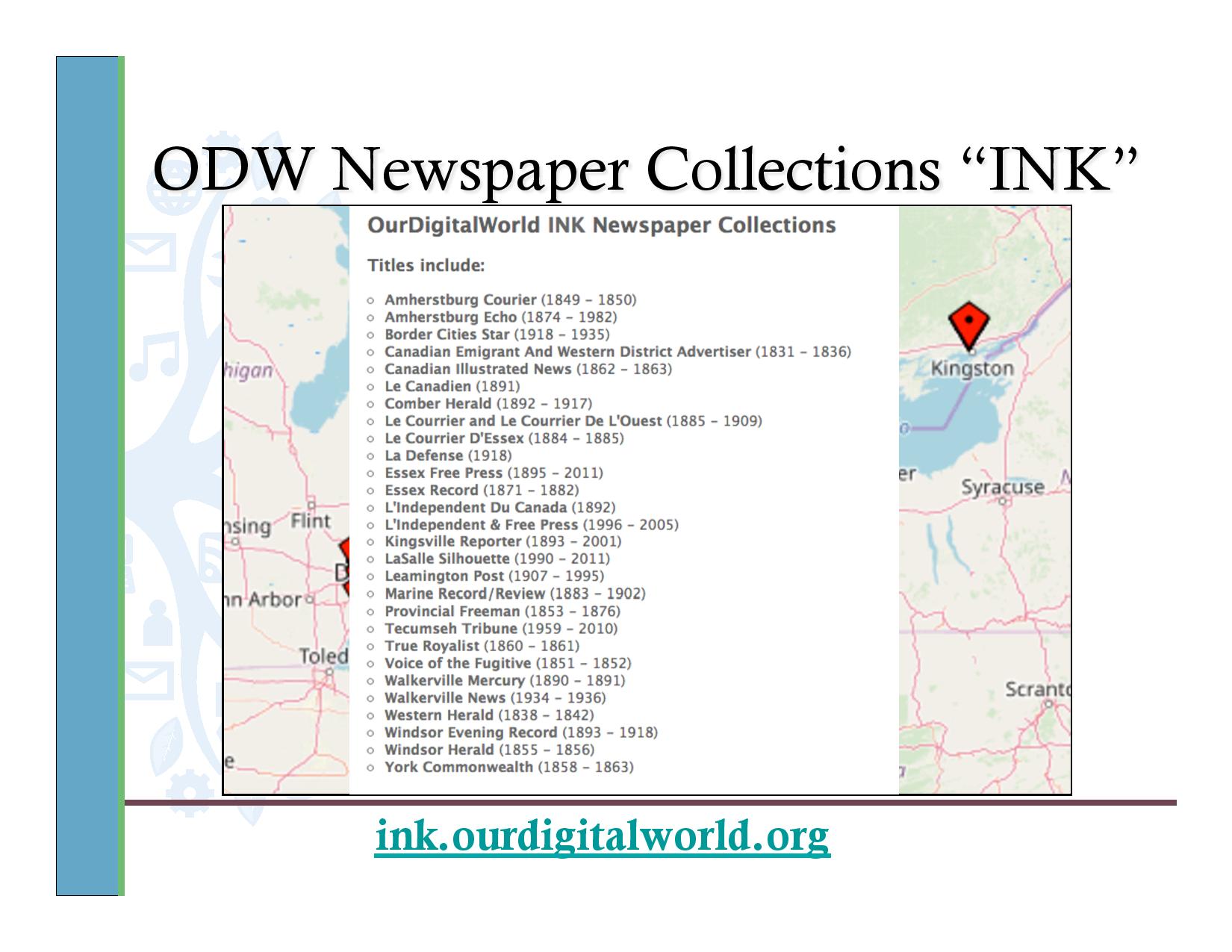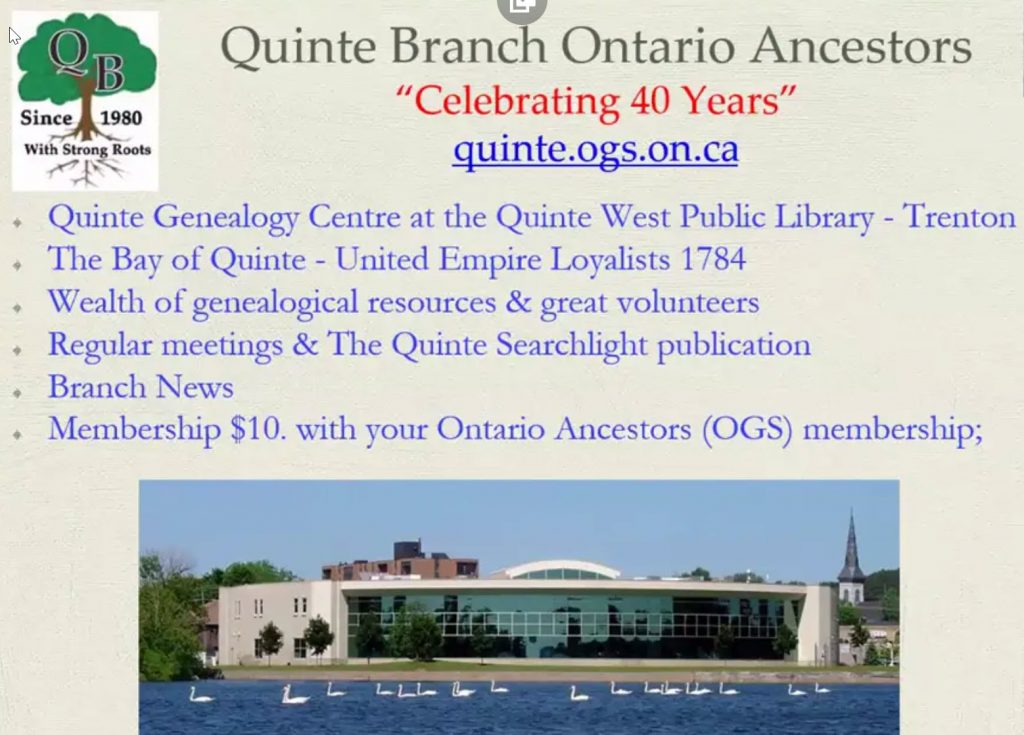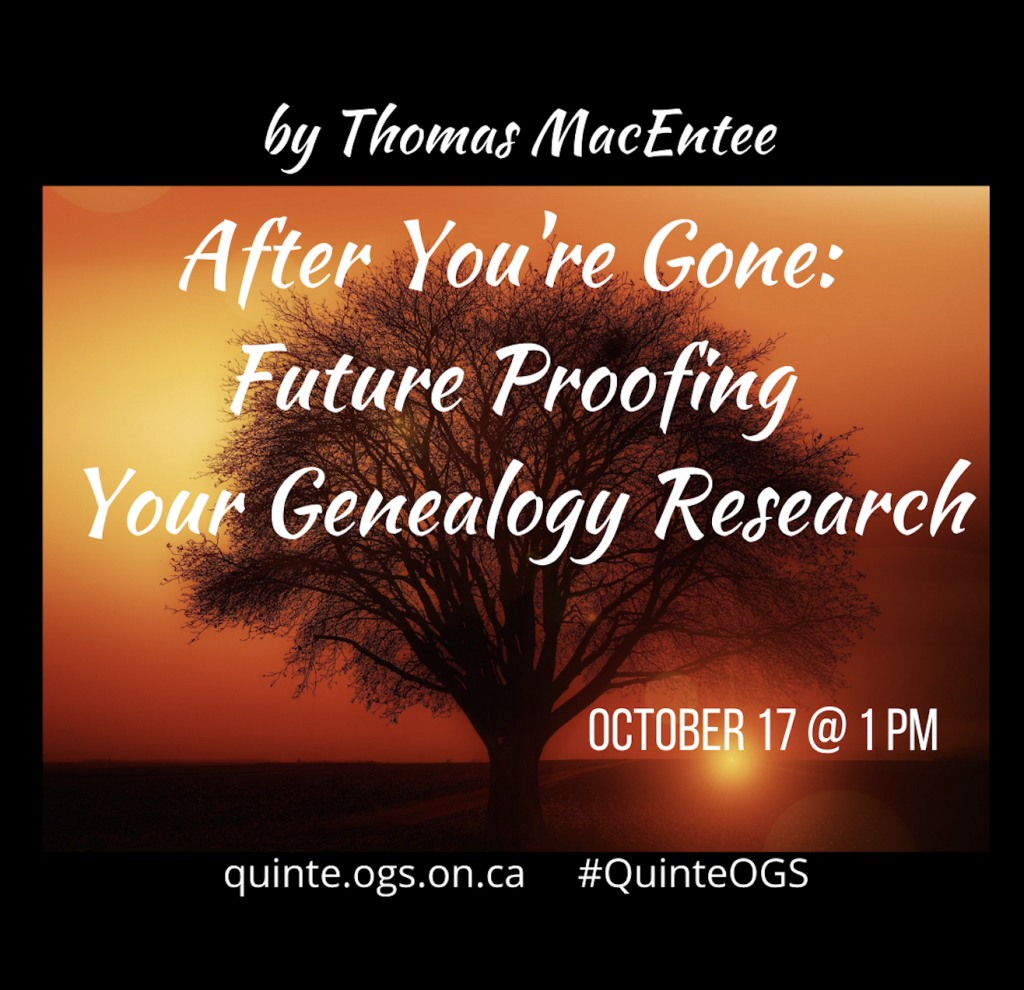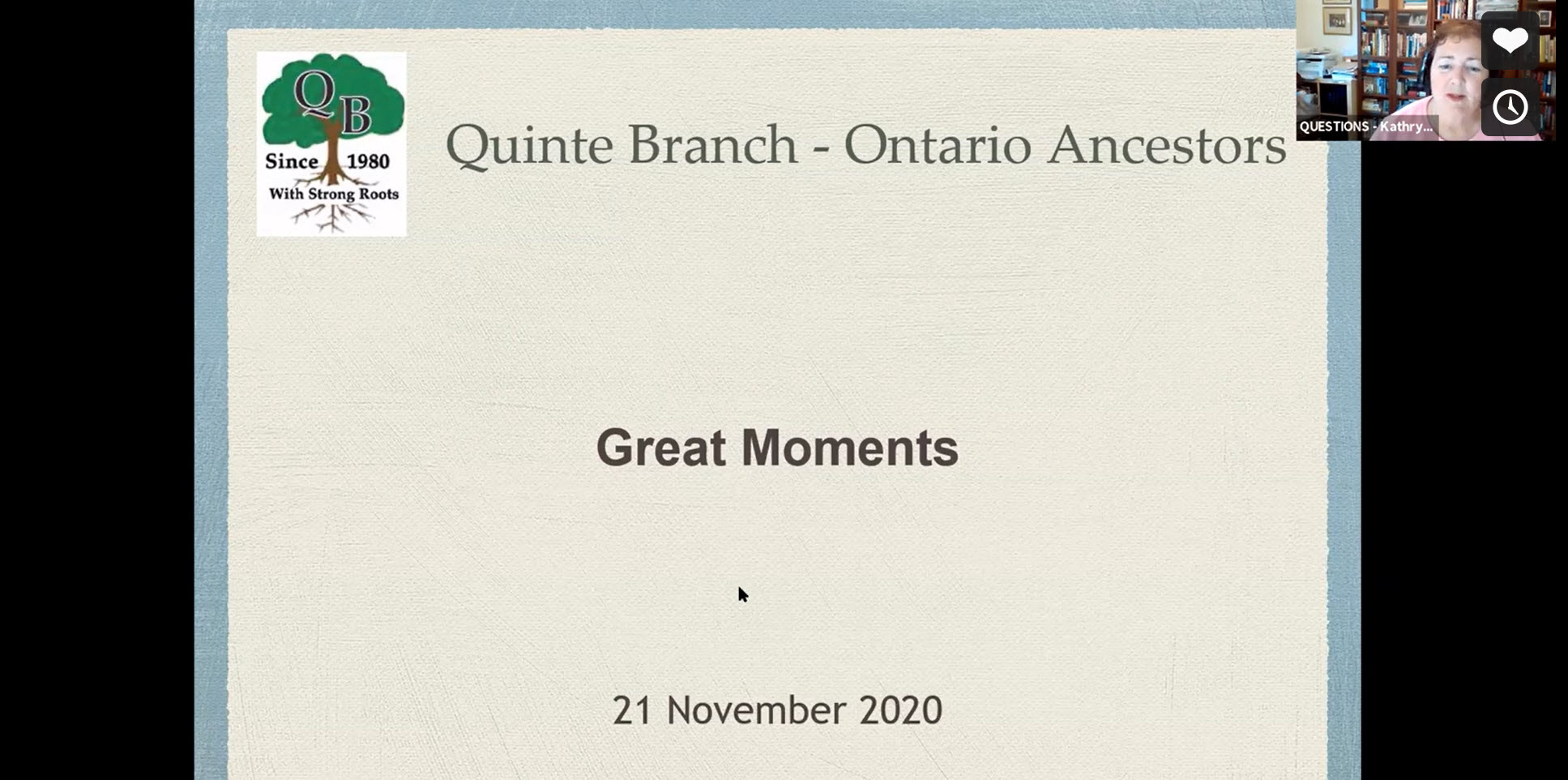Quinte Branch News
“Forty Years … Supporting the Geneology Community”
2021 | 2020 | 2019 | 2018 | 2017 | 2016 | 2015 | 2014
2012-2013 | 2011-2012 | 2010-2011 | 2009-2010
2008-2009 | 2007-2008 | 2006-2007 | 2005-2006
- The Ins and Outs of FamilySearch
- Researching Early Quakers in Upper Canada
- Expanding Your Research Through Online Newspapers
- Future Proofing Your Genealogical Research
- Great Moments Goes Virtual
The Ins and Outs of FamilySearch.org
Presentation by Nick Post
Article by John Carew
Photography by Wayne Wickson
Nick Post took on a big task for a Saturday afternoon genealogy lecture: he explained how FamilySearch came about and highlighted the benefits of using it. He took the group through signing in to the program and discussed the different areas within the site; providing examples from his own Family Tree. Nick also outlined partnerships with other Family History sites, indexing and additional programs. Finally, he discussed updates and future changes coming to FamilySearch. He is a “Temple and Family History Consultant” at the Oshawa Stake Family History Library.
For most if not everyone in the room, Nick’s presentation was twofold: a refresher about the “family search” site that we have used over the years, and a catchup on the innovations of convenience and enhanced research features that have blossomed forth in recent times. We would have expected that the focus of the presentation would be zeroed in on FamilySearch.org, but in a very significant way it left the door open for a more global and collegial view of the opportunities for us to pursue our research objectives. The Family History Guide, released this year by The Family History Guide Association at www.thefhguide.com , offers a very generous review of FamilySearch, Ancestry, My Heritage and Find My Past, in the context of how to look at each site for the opportunities we may be looking for or trying to expand into.
No doubt, we are very much at the crossroads of the technology and information ages, and all you need to do to take advantage of this lecture by Nick Post, whether you were there or not, is to visit The Family History Guide Association and educate yourself online at www.thefhguide.com , and similarly at the four websites of the genealogy enterprises featured, Family Search, Ancestry, My Heritage and Find My Past to get their take on opportunities directly. And don’t stop there! Take this moment to review what is going on at websites and organizations that might be the right locations for you to visit again some time.
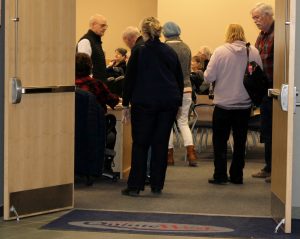 |
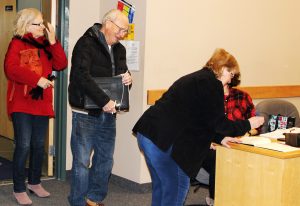 |
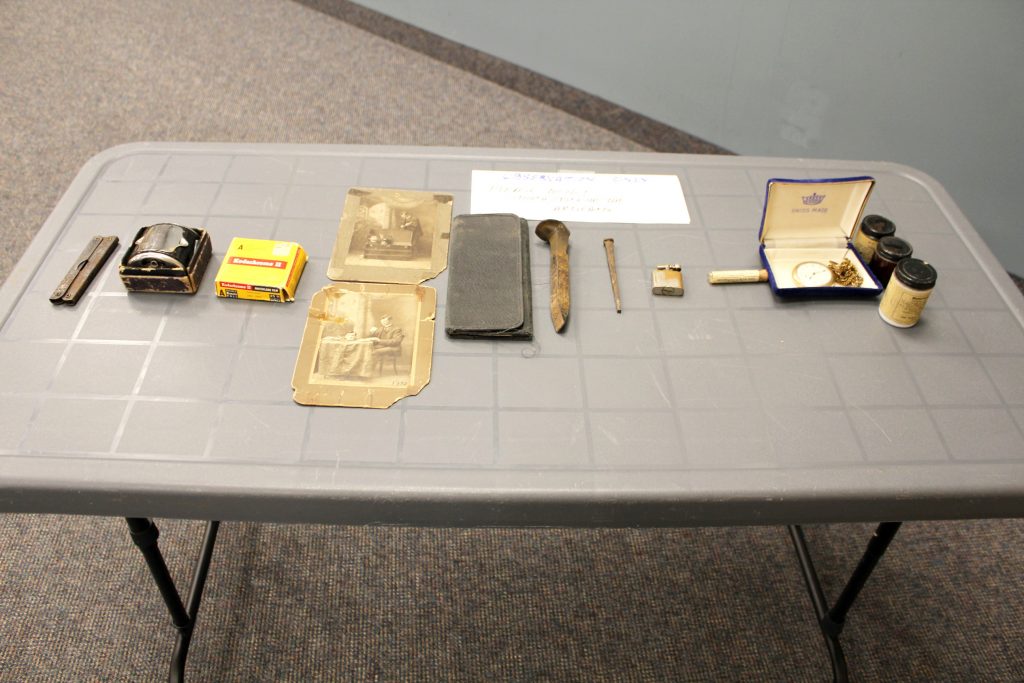 |
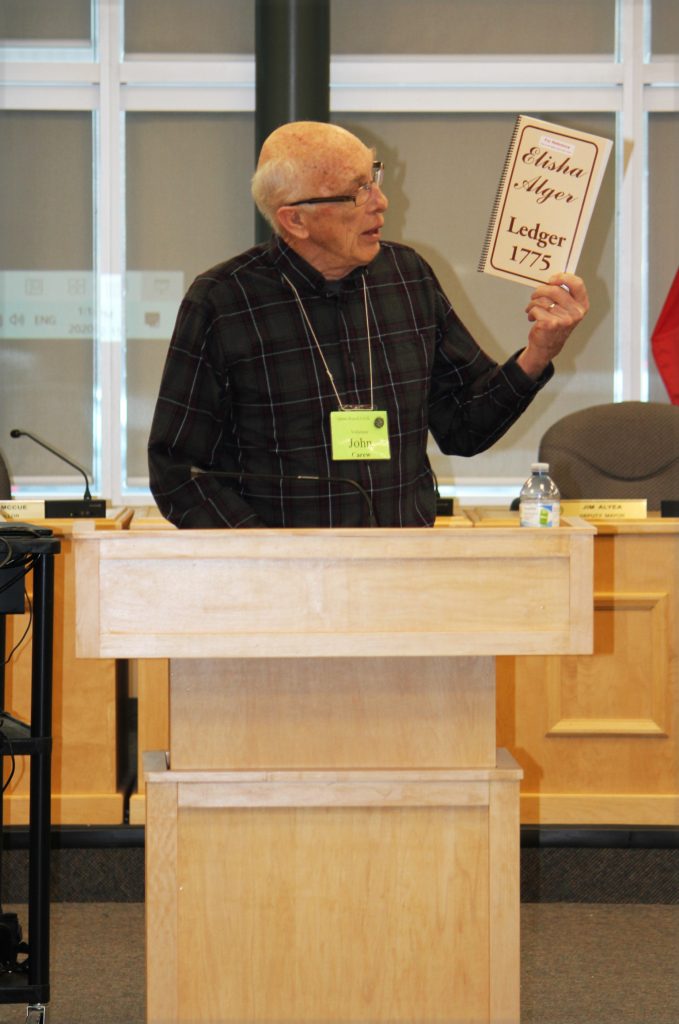 |
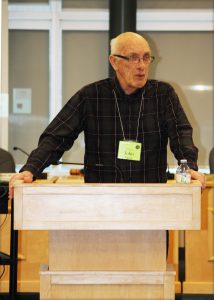 |
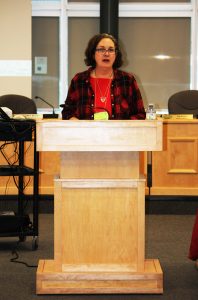 |
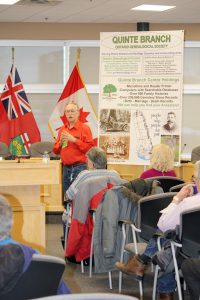 |
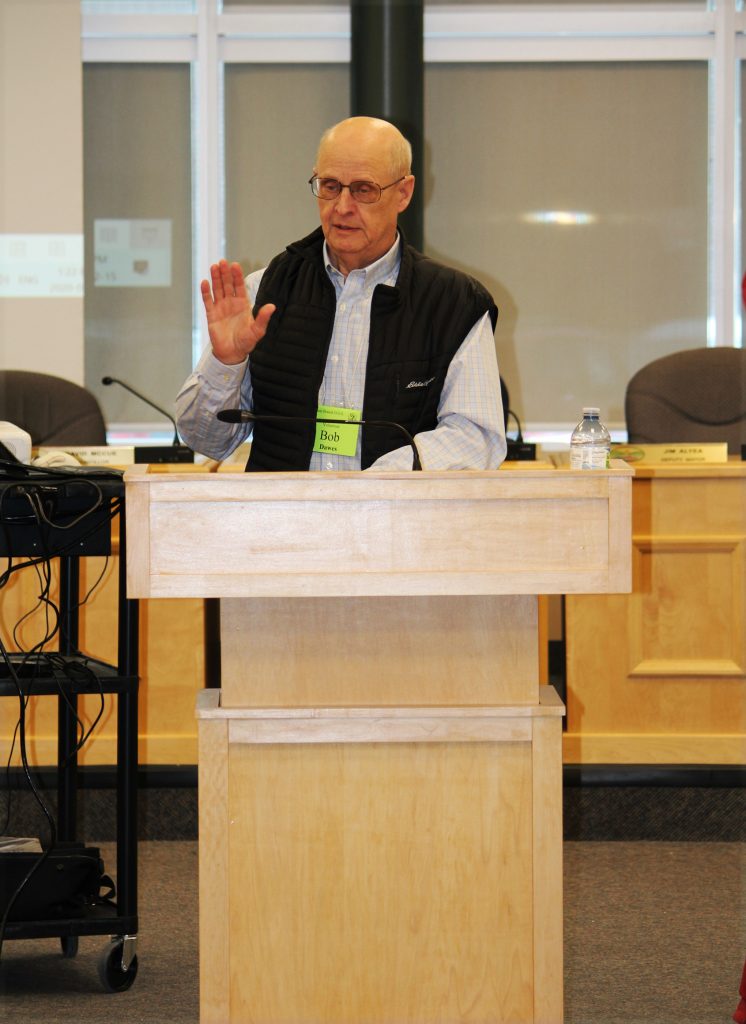 |
NICK’S MYSTERY OBJECTS
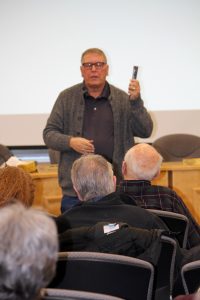 |
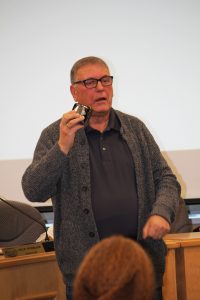 |
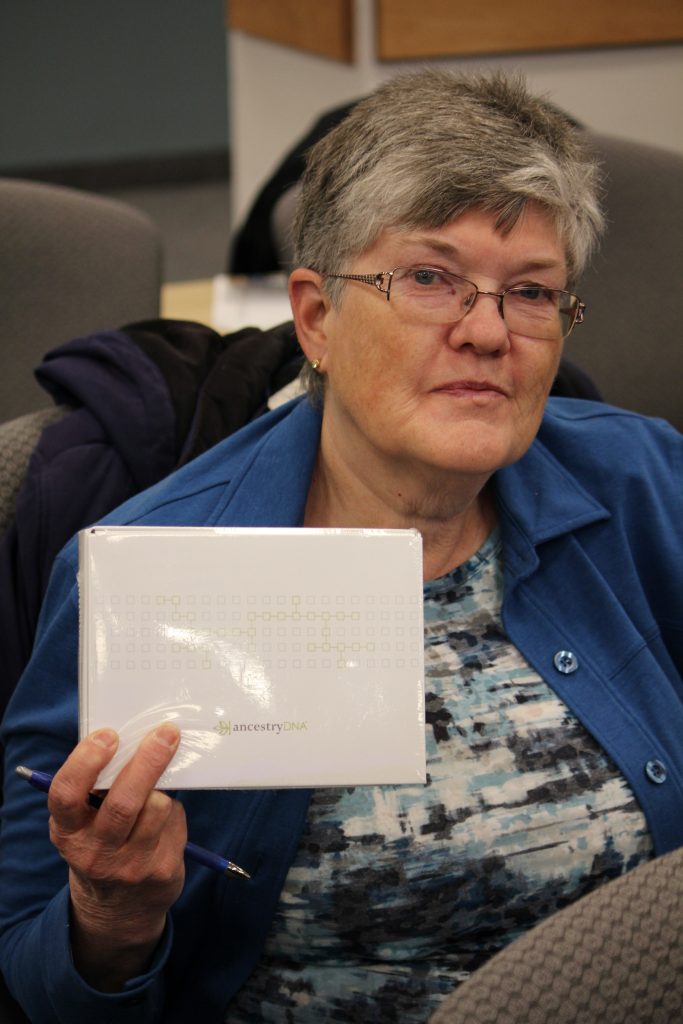 |
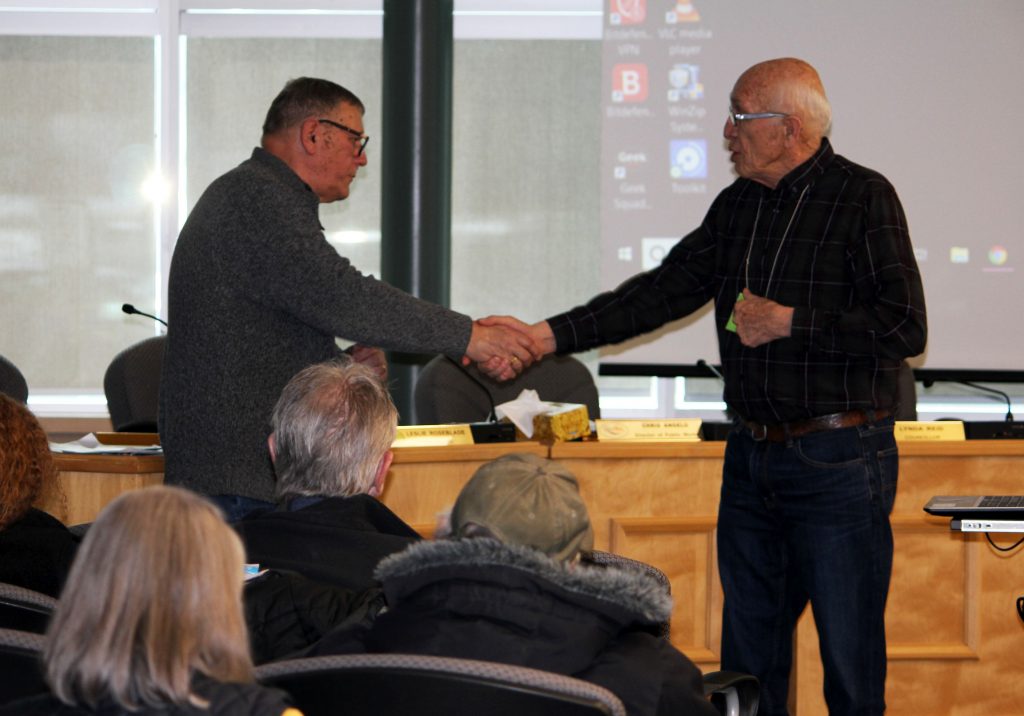 |
NICK POST’S GENEALOGY LINKS
Family History Centre – Trenton Ontario
– – – – – – – – –
How to Research the Early Quakers in Upper Canada
Presentation by Randy Saylor
We started 2020 with aspirational objectives of several high-quality presentations leading to our 40th Anniversary Branch celebration scheduled for June 20, 2020. That would have been an ideal shot at the moon if we were playing darts. After the great snow of January (cancel the Crouse Wanamaker presentation), we had a very nice reprieve in February with Nick Post talking about FamilySearch.org. A three-month snow storm in March, April and May would have been much better than what transpired, but we were not that lucky. The Coronavirus and the consequential Covid-19 Pandemic scuttled the balance of our Quinte Branch 2020 public meetings and presentations! During the forced holiday (stay at home, Quinte style) the Council had virtual meetings using Microsoft Teams, Zoom and telephones when our tech skills failed us. Somebody said at one of the meetings “they’ll probably make a movie out of this craziness”. Then we phoned Randy. In case you are wondering, Randy Saylor is Peter Johnson’s cousin, Linda Smith’s cousin, and my wife Susan’s cousin. If that isn’t enough, he is a great genealogist and a past-master webmaster.Randy was born in Trenton and has lived with his family in Toronto since university. He retired as a High School Principal nearly 20 years ago. Like many genealogists he seems to have had the bug early in life and started his own Quinte based web site in 2005. His interest centers around the social life of the times of the ordinary folk who made up the majority of the early settlers.In quick order, Randy volunteered to be our first-ever virtual presenter, a team of under paid and over worked Quinte Branch volunteers with help from OGS put the package together, and on June 20th, we held our first online Branch Meeting, starring Randy Saylor and the Quakers. Success!Randy gave some Quaker history background and commented on their settlement in the Quinte area starting in the early 1790’s. The main theme of his presentation however was on the structure of the Quaker community and how this impacts the many interconnected Quaker records that have survived both in the United States and Canada. Understanding the hierarchy of Quaker meetings and their relevance to Quaker life gives a researcher a better ability to find records of interest. Quakers kept minute books, marriage, birth and some death registers plus removal records when families changed their locale. These amazing records are very helpful to genealogists. Randy also outlined where various records can be found, online and otherwise.
Research Notes and Hints (from Randy Saylor)
Quaker Resource Guide
Prepared for the Quinte Branch OGS 20 June 2020 Webinar
by Randy Saylor
Check out Randy’s web site at the URL linked below:
http://freepages.rootsweb.com/~saylormowbray/genealogy/
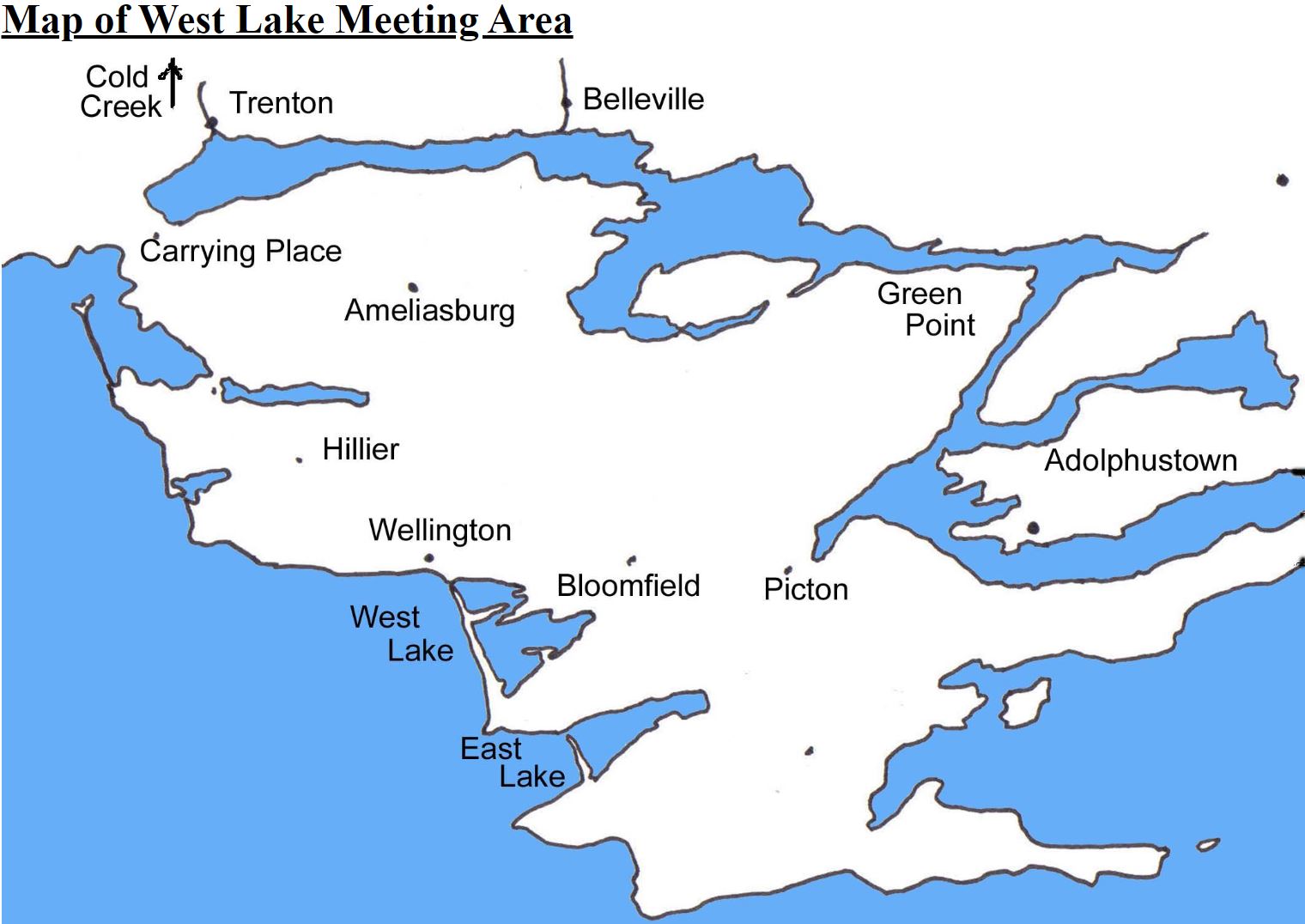
Members of the Society of Friends, commonly called Quakers, arrived in Upper Canada before 1800 from both New York, Vermont, New Jersey and Pennsylvania and settled in pockets where they could purchase excellent farmland – Prince Edward County, Niagara area, north and east of Toronto and along the north shore of Lake Erie. They left a rich record in their minute books, registers and other ephemera for both the genealogist and social historian.
Canadian Friends Historical Association (CFHA) since 1972
The CFHA is an active association that has become known for a large number of transcribed minute books, registers, journals, research as well as past Newsletters and Journals. These are available free on the website.
In 1974 the Canadian minute books held at the Archives were microfilmed. A list of these microfilms was published in the CFHA Newsletter #13. Many of them have been transcribed on CFHA.
CFHA holds an annual conference each September. The website has an active blog.
Maps and Charts of Canada, NY and Philadelphia Yearly Meetings
CFHA has prepared a pdf of the map and charts done by Arthur Dorland in 1927 and they are included as endnotes in his book, A History of the Society of Friends (Quakers) in Canada. A few links to other maps are provided as well. PDF
Quaker Archives and Library of Canada
The Quaker Archives is at Pickering College, Newmarket, ON, and is the undoubted major repository of Canadian Quaker Records. The credit goes to Arthur Garratt Dorland, Quaker, history professor at the University of Western Ontario, who from the 1920’s onward collected old minute books, registers, religious and history books, scholarly journals, personal journals (Timothy Rogers), letters and much else. The Dorland Reference Library at the college honours his role. Most of the registers and minute books have been microfilmed and these films are available at the Archives of Ontario and on Ancestry.com. The Marion Cronk Fonds has a lot of Quinte area material and the finding aid is on the website.
The website has a catalogue of holdings, a genealogical index, finding aid to the Marion Cronk Fonds and a number of other indexes of their holdings. The microfilms done at that time are now on Ancestry.com. A name index has been created. Searching the books that have been transcribed at CFHA gives an easier to read background to the event.
Ancestry.com
Researchers with a paid account at Ancestry will recently find 76 Quaker collection titles in the Card Catalogue searching with the keyword being “Quaker.” The Library edition only yields 14 titles.
Here are three major ones.
1. U.S. and Canada, Quaker Yearly Meeting Annual Reports, 1808-1930
This database contains hundreds of volumes of minutes from Yearly Meetings, which is the highest administrative level of the Religious Society of Friends (Quakers). The records span more than a century and come from more than 20 different Yearly Meetings including the following: Baltimore, California, Canada, Genesee, Central, Green Plain, Illinois, Indiana, Iowa, Kansas, London, Nebraska, New England, New York, New Zealand, North Carolina, Ohio, Oregon, Pennsylvania, Philadelphia, South Africa, Western (Indiana), Wilmington.
The minutes contain names of representatives and committee members, memorials and obituary notices, along with business news.
This collection is available for browsing only and contains no indexed records.
2. Canada, Quaker Meeting Records, 1786-1988
See CFHA Newsletter 13 for a complete list of the books that were filmed. This database contains records from various Quaker meetings in Canada. Most come from Ontario, but you will also find records from other provinces, as well as a few from areas in the United States that fell under jurisdiction of a Canadian Yearly meeting.
3. U.S., Quaker Meeting Records, 1681-1935
This database contains Quaker monthly meeting records which are archived at the following Quaker colleges: Earlham (Indiana), Guilford (North Carolina), Haverford and Swarthmore (Pennsylvania).
Notably absent are the New England and Philadelphia Yearly meeting minute books which will be available soon with a membership at Find My Past.
- Religious Society of Friends Papers, F 997, MS 303, 59 reels, Private Records. The finding aid is with the yellow binders listings all the meeting records that were in the possession of the Quaker Archives in 1975. A few have been acquired since and are not filmed. This finding aid is available online in the 1975 Newsletter #13. PDF
- The blue card index lists about 20 holdings, mostly letters that have Quaker references. Search under Friends, society. There are a few Yonge St records.
- Rachel Cronk Fonds – F550, MU759 Robarts Library, University of Toronto
The library has several shelves of Quaker books. Many histories and also 19th C religious books. Most importantly it has a complete bound set of the Quaker History published by the Friends Historical Assoc, Haverford, PA. Volumes 1 (1906) to recent volumes. Search the Robarts web site to see the holdings. Link Here
Toronto Public Libraries
Encyclopedia of American Quaker Genealogy, Wm Wade Hinshaw, 1936 and later, 6 Vols. Vol 1 – North Carolina; Vol 2 – Penna and New Jersey (Salem, Burlington, Philadelphia, Falls); Vol 3 – New York (Flushing, Westbury, Jericho), Vol 4 and 5 – Ohio; Vol 6 – Virginia. This is a major index to some of the records of the Monthly Meetings.
Library & Archives of Canada, Ottawa
List of the archives of the Religious Society of Friends (Quakers) in Canada: microfilmed by the Archives of Ontario (MS303) / prepared by R. Nickerson . CD 3649 O5 N63 1975
Suggested Books – available in many libraries
- A History of the Society of Friends (Quakers) in Canada, Arthur Dorland, 1927, [updated in 1968 to reflect the Quaker reunion of 1955.] Available on Ancestry.com
- From Quaker to Upper Canadian: faith and community among Yonge Street Friends, 1801-1850, Robynne Rogers Healey, Publisher Montreal; Ithaca: McGill-Queen’s University Press, 2006
- Children of Peace, John McIntyre, McGill Queen’s Press, 1994
- Quaker Crosscurrents: three hundred Years of Friends in the New York Yearly Meeting, Hugh Barbour, Arthur Worrall, and Christopher Densmore, 1995, Robarts Library BX 7607.N5 Q34. Available on Google Books. Highly recommended.
- Quakers in Colonial North East, Arthur Worrall, 1980, 289.674 W59 [Robarts BX 7639.W67].
- The Hicksite Separation, Robert Doherty, 1967, 289.609 D57, [Robarts BX 7637 D6]. A fine account of the difficult to understand separation.
- Families, OGS, Vol 19, No. 1, 1980, two excellent articles by James Zavitz and Jane Zavitz about Quaker history and using Quaker records.
- Quaker Marriages in Upper Canada, Wm Riddell, OHS Papers and Records, 1927, V24, 507-11. The legal issues behind the acceptance of Quaker marriages.
US Quaker Records
- Swarthmore, Haverford and Bryn Mawr Colleges hold the major collections of Quaker records. They have joined forces to present their digital offerings on this Triptych web site. Click Here
- Not everything is on line so see this Tricollege Library web site to search their catalogues. Enter your search word and then select a result of interest. On the new page click on “Collection Organization” for detailed list of holdings. Scroll down through them.
Or visit each College archival web site separately. Here - Special Collections
- Click Here
- At Swarthmore, see the James E. Hazard Index of The Records of New York Yearly Meeting of the Religious Society of Friends. This will replace Hinshaw as the index for NY records as it is more complete. Link
Other web sites – Google the following:
- Volumes of The Friend, A Religious and Literary Journal, at times published weekly, from the early 19th C are packed with genealogical information such as obituaries. These volumes often surface in google books during searches.
- Friends Historical Association – publishes the American scholarly journal Quaker History.
- New York Yearly Meeting Microfilm Collection (NYSL) – a list of NY meeting records that have survived.
- Records of the Philadelphia Yearly Meeting. For example, Muncy Meeting.
- Earlham School of Religion – 17 and 18thC Quaker books online.
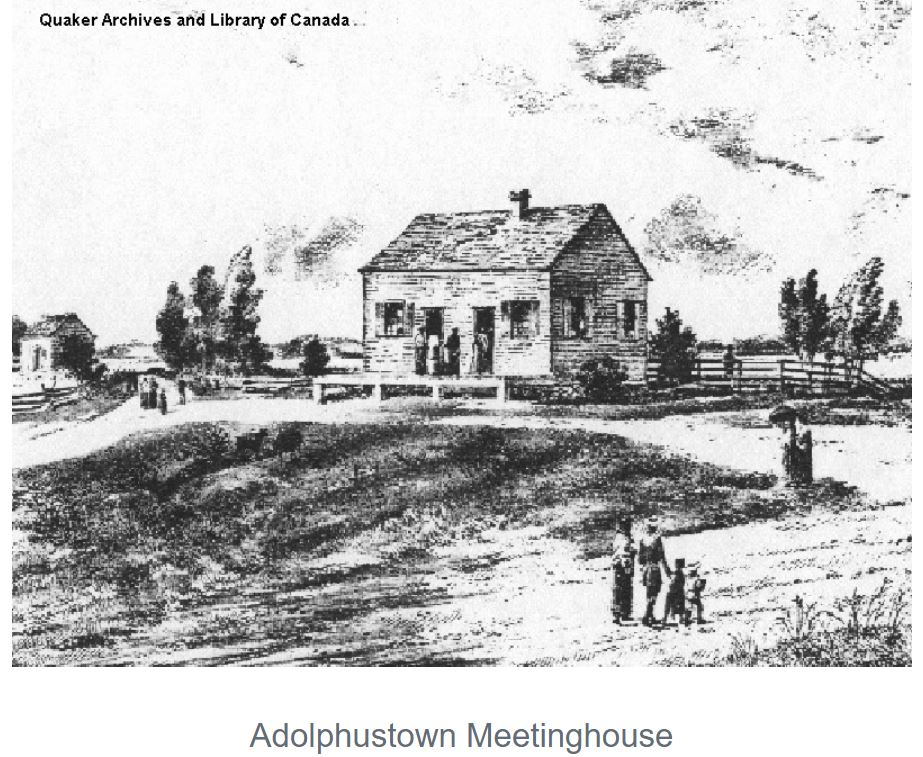
Finding Your Family History with Online Newspapers
Presentation by Jess Posgate
Article by John Carew
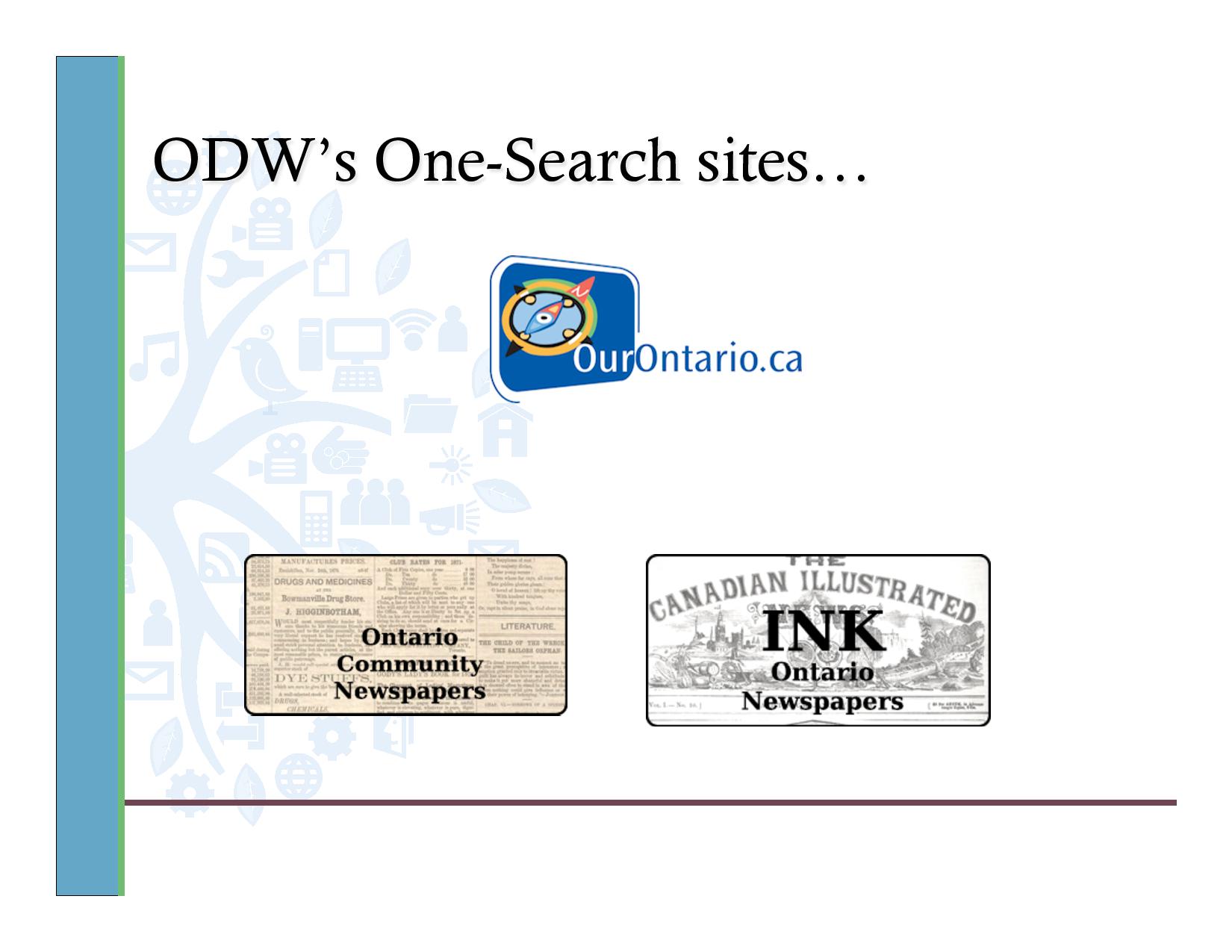
After You’re Gone: Future Proofing Your Genealogy Research
Virtual Presentation by Thomas MacEntee
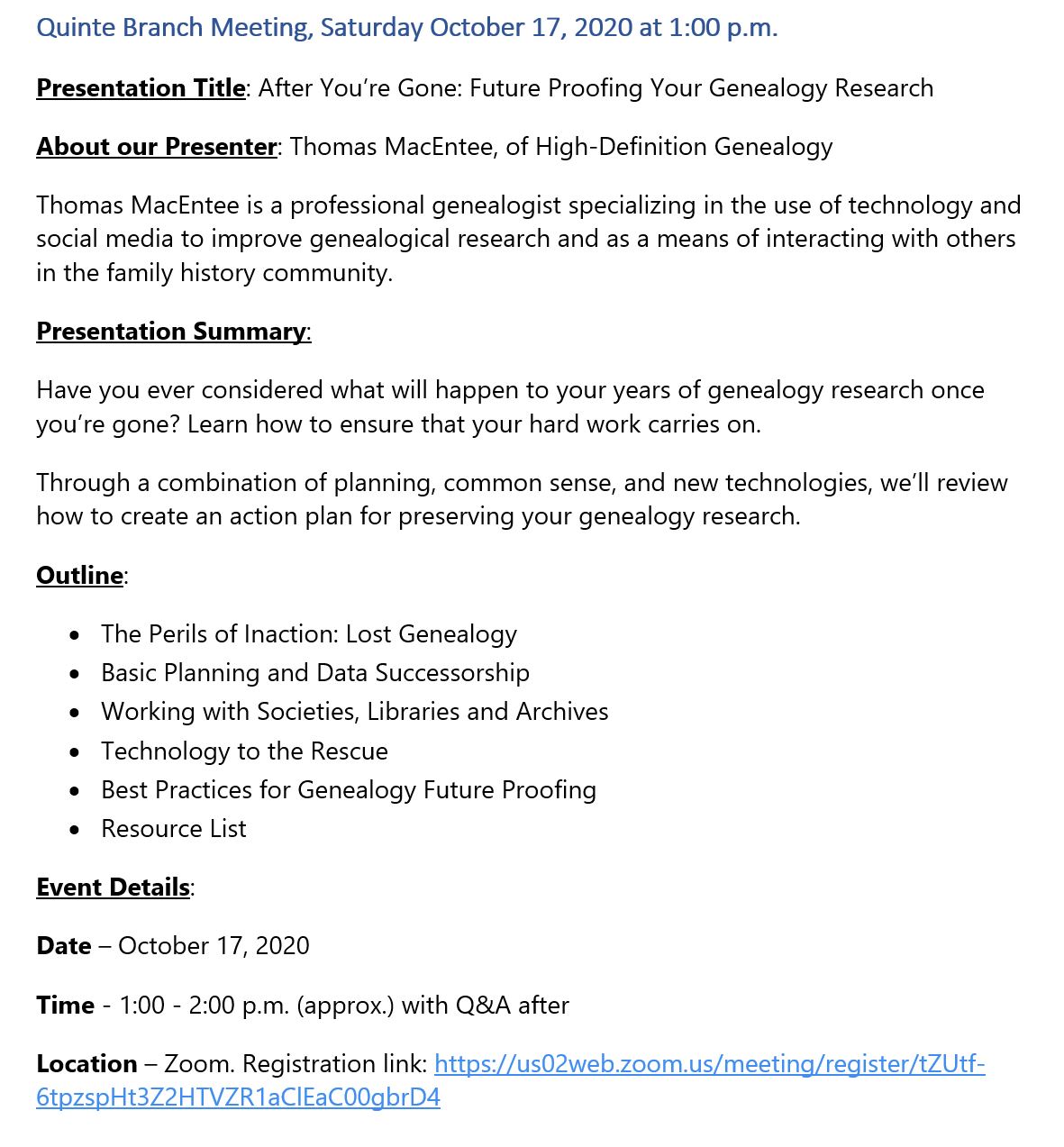
After You’re Gone: Future Proofing Your Genealogy Research
© 2020, copyright Thomas MacEntee. All rights reserved.
CLICK HERE TO DOWNLOAD THOMAS MacENTEE’s LATEST FLYER
POSTER DESIGNED by CHERYL LEVY
Great Moments Goes Virtual
Presentations by Cheryl Levy, Jane Simpson, Jim Kennelly, Lorraine Green, Wayne Wickson
Article by John Carew
Facilitated by Kathryn Potter
Technical Assistance by Kim Barnsdale
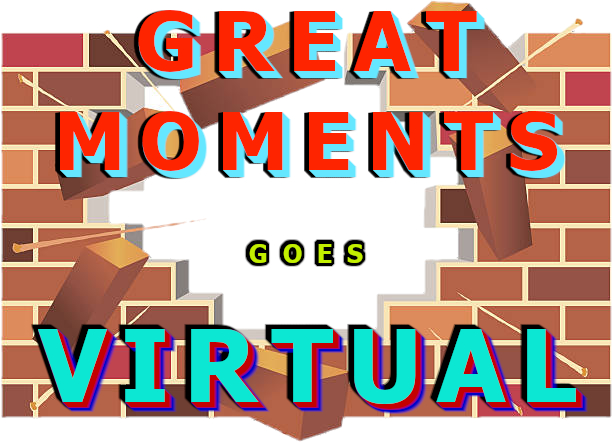
Great Moments in Family Research
Quinte Branch OGS
November 21st, 2020
Some things manage to get a great start in life as a means of solving an annoying and completely unrelated problem. Some annoying problems can’t be solved easily, but with resolve and patience wonders can happen. Perhaps an explanation is in order.
About 6 years ago, after a couple of poorly attended Annual General Meetings (AGMs), Branch Council was getting a little peeved about trying to run Elections with not enough volunteers to run for or fill open Branch Council positions. A certain commitment to parliamentary procedures in a genealogy setting, and interest in low level politics seemed to be lacking. Arranging a speaker for a full-fledged presentation was not a popular solution, given the problems of timing and scheduling for a mostly business meeting. It was decided that a few short talks by volunteers about family history research would a better match with the AGM routine, and it might provide some fun into the bargain, along with opportunities for members to hone their presentation skills. Most of all, more members would want to come out to participate in the AGM and volunteer to serve on Council, and be treated to some interesting research presentations. We would call it “Great Moments”.
So, here we are, 6 years later, taking refuge from the Covid-19 pandemic, trying to stay and free of the virus, waiting for a vaccine to clear the air and save us and our relatives from a very unpleasant illness and life-threatening experience. Covid is now part of our family histories. More so, Covid is what brought us together in our virtual world of Zoom, to hear about Great Moments! As we are about to begin our first virtual Great Moments event, it is only fair that we share the outcome of our experiment with the AGM meetings from 6 years ago and our brainwave, Great Moments. For some reason, we never did see much of an upward change in attendance at the AGM meetings. The Council Chambers were just as empty 6 years ago as they were at the last AGM. The big change was that as soon as the Elections were over, everybody got a big smile on their faces, and settled in for Great Moments presentations. Every year, same, same. Now we advertise Great Moments, and run Elections as a surprise. Go figure!
So, on with the show. We were lucky enough to have 5 volunteers step forward to present on November 21st at the Quinte Branch Zoom Meeting. Leading the charge: Cheryl Levy, Jane Simpson, Jim Kennelly, Lorraine Green, and Wayne Wickson.
Cheryl’s topic was “What’s Your Story”. Basically, in order to tell your story, you have to follow the trail of clues to find your ancestors, uncover the ancestors by digging deep enough to understand their stories and then unlock the mysteries linking the generations before you. In a few minutes, Cheryl explained how she discovered significant military ancestors from the U.S. who helped populate the Maritimes and who played important roles in the Seven Years War, the American Revolution, and the War of 1812. She also discovered ancestors of the Bourne family with links to the Mashpee Wampanoag tribe, and later the President of the Singer Sewing Machine Company. In all, to know your story, you need to research and know the details of your ancestors and their stories. For good measure, Cheryl added in her special relative, William Brewster, a Mayflower immigrant.
In a short story entitled “Message from the Grave, “focusing on the Gerow family, Jane Simpson unraveled a story which was begging for better notes which could have made her original research easier to complete. With respect to the heroine, Charity Gerow, Jane eventually found Charity’s burial place, in the Old Loyalist Burial Ground, Saint John N.B. AS well, she unraveled Charity’s birth and death dates, 1741-1840 and the details of multiple marriages, name changes, and successive Cemetery Transcripts.
Jim Kennelly offered up a story about his ancestor James Armstrong, and Mary Anne McKey, entitled “In Ireland, A Catholic and A Protestant Marry. As an Irish descendant, I knew the conclusion might not be complete or fully documented, but Jim did a masterful job of getting as close to perfect as he could. Mary Anne and James began their journey together in Northern Ireland, around 1822, married in 1848, a little early for the approved marriage of a member of the Irish Constabulary, and eventually made their way to Canada, soon enough to appear in the Canada Census of 1851. James converted to Catholicism in order to raise his children as Catholics. They lived out their lives near Kaladar, and they are buried near Coehill.
Lorraine Green tackled the topic of “Lessons Learned by Accident”. This involved Lorraine and her mother who had settled in Toronto trying to locate her mother’s family who had moved from Buffalo to the Toronto area. Tobias and Margaret Heinrichs. Eventually, they discovered that the children or Tobias and Margaret had married in several different churches in the Toronto area. Accidentally, that discovery led to finding a neighbor who knew Tobias and Margaret and was able to connect Lorraine to the granddaughter. In a similar fashion, Lorraine’s Quinte area ancestors were discovered and documented. Lorraine invited any members of the Brooks, Blakely and Coles from the Quinte area to make contact, as they are probably all related.
The final presentation delivered by Wayne Wickson was done as a video describing the effort made to locate and document Wayne’s great, great grandfather William Campbell and his wife Sarah Ann Havens. They had moved to Canada prior to 1851 and were documented in that Census for Northumberland County. As Wayne was zeroing in on his Scottish heritage, he began to realize that several William Campbell candidates were in fact from different families. At the time, 2010, DNA sampling and testing was coming into vogue, and Wayne decided he would have to go hard over on technology to settle the matter. He narrowed the field of William Campbell candidates who came to Canada, had similar birth and death dates with the William Campbell he had been researching. When the dust settled, Wayne had achieved a near perfect match between William and his two brothers, Adam and George.
Thanks to all of our presenters, and for the supportive audience of about 60 family historians who joined us for the afternoon.
John Carew
PLAY THE VIDEO RECORDING ON VIMEO
